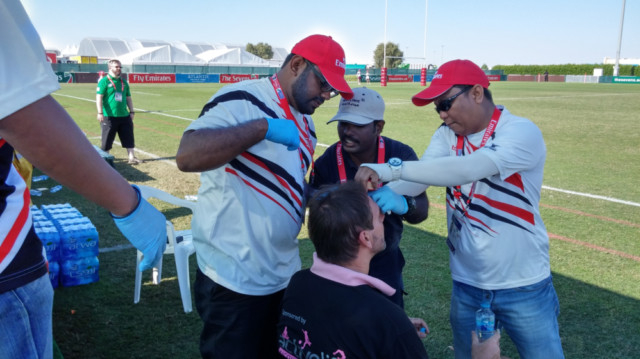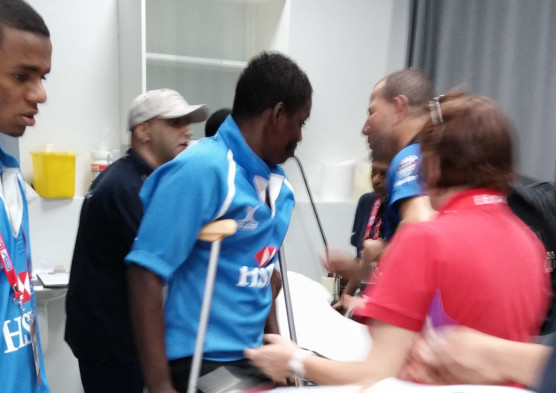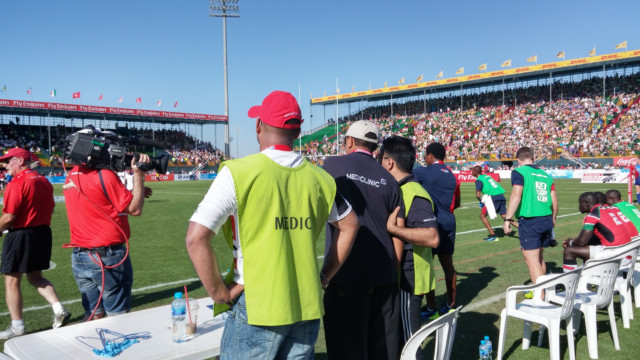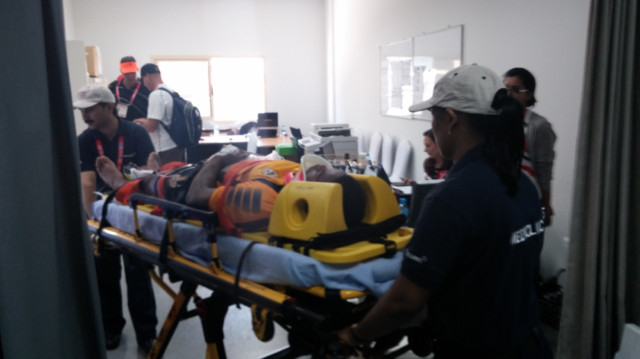
DUBAI As the 45th Emirates Airline Dubai Rugby Sevens kicks off amid high expectations at the Sevens Stadium in Dubai on Thursday, the fierce rivalry among its 3,600 players will throw up an equally big challenge: Ensuring medical cover to the casualties.
If last year’s tournament -- spread over three days -- is anything to go by, doctors will have to be prepared to treat one injury every seven minutes.
“You never know when someone gets knocked down. Rugby Sevens is a very fast-paced, high-impact contact sport. The turnover of injuries is very high. In 2013, we treated a total of 302 injuries over the three days. So that’s around 100 a day from 8am to 10pm, or one every seven minutes,” said Dr Abdulrahman Mohammad, medical director of the Mediclinic Welcare Hospital, a key medical provider of the tournament.
Donal Kilalea, tournament commercial and site operations manager of the Emirates Airline Dubai Rugby Sevens, said: “The Emirates Airline Dubai Rugby Sevens is a world class event and the medical services provided on site are commensurate with the size and calibre of an event which has over 250 teams and 3,300 players.”
Dr Mohammad said: “The clinic can be overwhelmed with cases that include serious head and neck injuries, arm and leg fractures, dislocated hips and shoulders and broken lips and noses.”
Medical cover
The most serious injuries are those involving the head and neck. “Head injuries can result in concussions, heavy bleeding and sometimes death, though we have been fortunate that we have not had any death cases so far. Neck injuries can also be very serious as they can affect the spine. There can be cases of respiratory failure too.”
Although his healthcare group has been providing medical cover for the tournament since 2003 (barring two years in between), Dr Mohammad said: “We do it every year but every game is a new challenge, there can be a lot of variables. Moreover, we do not have an immediate back-up of radiology, ICU and other specialities. So it’s critical for us to think fast and think right. There is no time to be lost. We treat the mild to moderate injuries at the bay but rush the serious cases to hospital after providing first aid.”
Last year, around 10 per cent of the casualties had to be sent to hospital for fractures, head or neck injuries.
Dr Mohammad said he has 14 Mediclinic doctors, 14 paramedics and three ambulances at his disposal to treat patients. “The clinic has eight beds and all necessary equipment like medicines, splints, plasters etc for immediate treatment. It also has a physiotherapy section.”
He said players should be careful and equip themselves with safety gear like helmets and necessary padding. “Amateur team players are not regulars, so they should be extra cautious. We also tell players to pay heed to the doctors’ advice. If they are asked not to return to the field, they should not go back.”
Besides the nature of the injuries, he said language can also act as a barrier. “Many players do not speak either English or Arabic and often, team leaders may not be present with them. So effective communication can also pose a challenge at times.”
All Set for Rugby Sevens
The Emirates Airline Dubai Rugby Sevens, which began with a small group of British expatriates at Dubai Exiles RFC 45 years ago, has now evolved into one of the world’s premier Sevens events. A must attend sporting and social affair, thousands converge on the Sevens Stadium to watch the thrilling series of matches over three days. This year, it will be held from December 4 to 6.














